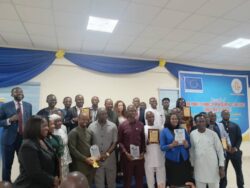By Sandra Agyeiwaa OTOO
The Programme Manager of Women In Law and Development In Africa (WILDAF) in Ghana, Lois Aduamoah-Addo, has highlighted the urgent need for enhanced gender inclusivity in traditionally male-dominated industries like petroleum, cocoa and mining during the International Women’s Day (IWD) celebration.
The event, aimed at fostering dialogue with regulatory bodies to explore avenues for increasing women’s involvement in these sectors, was orchestrated by WILDAF Ghana in collaboration with OXFAM. It falls under the umbrella of the PVP FAIR4ALL project, a 5-year initiative funded by the Netherlands Ministry of Foreign Affairs (MoFA).
The event, themed “Inspiring Inclusion in the Mining, Petroleum, and Cocoa Value Chains,” also seeks to bolster the capacity and engagement of civil society and policymakers in the extractive sector. This initiative aims to empower them to mobilize and advocate for enhanced access to justice opportunities for project beneficiaries, particularly women, within the cocoa, gold, and petroleum value chains.
“Today, we are commemorating International Women’s Day and the intention for this particular event is to engage the regulatory bodies within the petroleum, cocoa and mining sectors on opportunities available to deepen women’s participation in these sectors,” she stated.
Mrs. Aduamoah-Addo underscored the significance of actively promoting and assisting women in entering these sectors, historically perceived as male-dominated, calling for the removal of barriers to entry.
“These sectors have been defined as male-dominated areas, so at times, women are not encouraged or enticed to even want to be part of such sectors. So, we need to consciously create opportunities for them to get involve,” she explained.
To achieve this, she said capacity building and policy development are crucial. “We know capacity building is one, but we also need to create the environment. We need to intentionally make policies that are gender-sensitive, ensuring that women are also able to dominate and participate in the opportunities that are available in these sectors”.
The event urged regulatory bodies and stakeholders to unite in creating a more inclusive and fair environment in traditionally male-dominated sectors. Through advocating for gender-sensitive policies and backing women’s participation, WILDAF aims to facilitate greater diversity and representation in critical industries, leading to societal advancement and economic prosperity.
Acknowledging the significant contribution of cocoa, petroleum and mining industries to the economy, Kofi Asare, the Executive Director of Africa Education Watch, emphasizes the pressing need for gender equality within these sectors.
He asserts that to attain fair representation at managerial levels, it is crucial to encourage girls to pursue Science, Technology, Engineering, and Mathematics (STEM) fields from an early age.
“The cocoa, petroleum and mining value chains are very important because they are critical to employment creation and wealth creation, and that is why having gender equality manifest in these sectors is critical and very important. You cannot have a high representation of females at the management level if they are not highly represented at the lower level, especially within the technical realms of the industry,” he revealed.
Mr. Asare identifies primary obstacles impeding female engagement in Science, Technology, Engineering, and Mathematics (STEM) education, such as cultural biases and insufficient foundational support.
He advocates a grassroots strategy that promotes the investment in infrastructure, parental engagement and teacher training to foster an inclusive STEM environment.
“The low female participation in STEM is a foundational issue; only 12 percent of females are participating in STEM at the tertiary level because fewer levels of participation are recorded at the pre-tertiary level. So let’s go back to the basic level, focus on investing in infrastructure facilities for STEM and also orienting parents and other stakeholders at the community level to take an active interest in supporting their girls to participate in STEM,” he added.
“Most importantly, teachers must begin to learn how to adapt gender friendly ways of teaching, so that they don’t make maths and science subjects very difficult and non-interesting for females,” he further stated.










